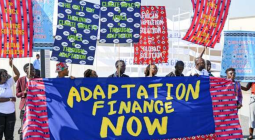With increased climate finance, Africa can lead the green industrial revolution
Africa could see the creation of millions of green jobs, along expanded and resilient global value chains – but for this to happen, it needs more international support
At COP29 in Baku, governments are convening to negotiate scaling up climate finance commitments, to keep the 1.5°C goal within reach and ensure sufficient funding to address escalating climate impacts.
The Independent High-Level Expert Group on Climate Finance has concluded that emerging markets and developing countries, excluding China, will require approximately $2.4 trillion in annual investments by 2030 to fund energy transitions, adaptation and resilience, address loss and damage, and conserve and restore nature. This amount is four times higher than current levels.
With the backdrop of this global financing imperative, Africa has positioned itself as a key player in the climate action agenda. The Nairobi Declaration on Climate Change and Call to Action, adopted at the inaugural Africa Climate Summit in 2023, articulates a bold vision to tackle both the climate crisis and Africa’s economic development needs through climate-positive growth.
Leveraging Africa’s immense human and natural resources, the Declaration emphasised the continent’s potential to play a central role in the global climate effort, notably by harnessing renewable energy for industrial activity; deploying climate-smart, restorative agricultural practices; and enhancing nature and biodiversity.
Climate-positive growth in Africa is inseparable from the urgent need to scale climate finance. Realising this dual priority is not just a regional challenge – it is a global one. What future can we imagine for Africa and its neighbours if global temperatures exceed 1.5°C?
Even at 1.3°C of warming above pre-industrial levels, the continent has already faced devastating consequences. Wildfires have ravaged Algeria, Morocco and Tunisia, taken lives and destroyed landscapes. Droughts in the Greater Horn of Africa have wiped out 9.5 million livestock across Ethiopia, Kenya and Somalia, followed by flash floods that have claimed nearly 600 lives in the Democratic Republic of Congo, Kenya and Rwanda.
Unpredictable rainfall has caused injury, loss, and damage for nearly four million people in southern Africa, the Greater Horn and Madagascar. In Mozambique and Malawi, cyclones have resulted in 500 deaths and displaced half a million people. Without immediate action, further declines in livelihoods and mass emigration to less climate-vulnerable countries are inevitable.
Millions of green jobs
If there is success in the COP29 climate finance negotiations, the future of our continent could be transformative. We can achieve the vision of green industrialisation and see the creation of millions of green jobs, along expanded and resilient global value chains.
COP28 set a goal of tripling renewable energy by 2030 while transitioning away from fossil fuels. Africa, with 60% of the world’s best solar resources, holds a key to this transition.
We possess the bulk of the critical minerals that the world needs to decarbonise energy and transport. We possess one-third of the global potential for additional carbon sequestration from natural capital. We possess the greatest potential to increase food production. And most of all, our continent is young, motivated and entrepreneurial.
Africa is poised to make a major contribution to the global decarbonisation effort and lead the next wave of industrialisation by building modern, green industries.
Progress is being made across the continent. For instance, Angola, Malawi, Mozambique and Zambia are climbing the value-addition chain from resource extraction to mineral beneficiation and manufacturing. Other countries are looking into the production of green hydrogen for export, particularly Mauritania, Morocco, and Namibia.
While African governments are already putting in place policies and investment plans to make green industrialisation a reality, we need access to markets, certainty on carbon pricing, and long-term offtake agreements to unlock new forms of capital seeking emissions reductions, among other things.
Climate finance can bridge the gap between lowest-cost and green options, as well as provide support for technical studies and help mobilise capital investment through long-term emissions reductions purchase agreements.
The Africa Green Industrialisation Initiative and the Accelerated Partnership for Renewables in Africa, launched at COP28, are providing avenues for scaling up these nascent efforts.
At COP29, the Government of Kenya will be convening world leaders to drive this action agenda, embracing disruptive partnerships and unconventional alliances to leapfrog outdated industrial models. Africa has the potential to lead the green industrial revolution and increased climate finance is the backbone of this vision.
The outcomes of the COP29 negotiations must deliver for Africa’s climate-positive agenda. The alternative is simply not an option.
Cover photo: A woman looks at a solar panel, at a factory called Ener-G-Africa, where high-quality solar panels made by an all-women team are produced, in Cape Town, South Africa, February 9, 2023. (Photo: REUTERS/Esa Alexander)


